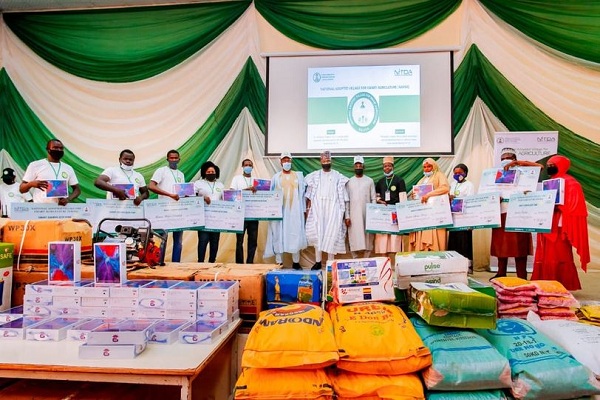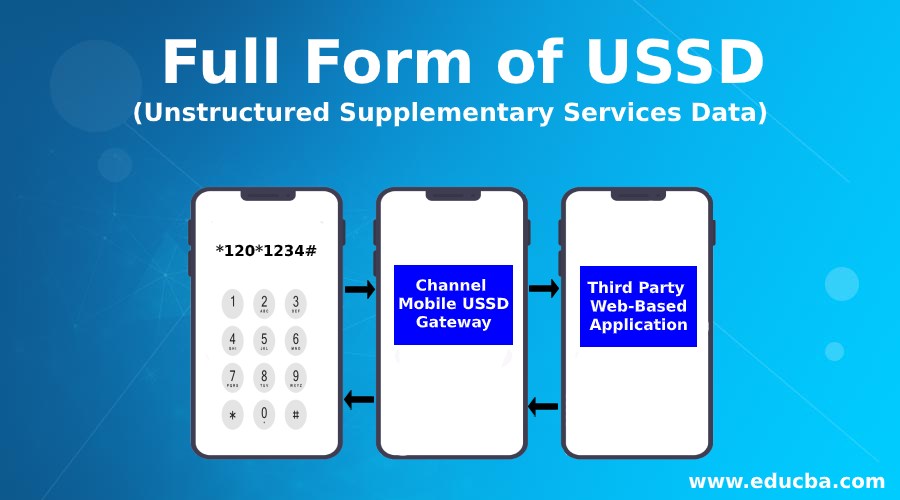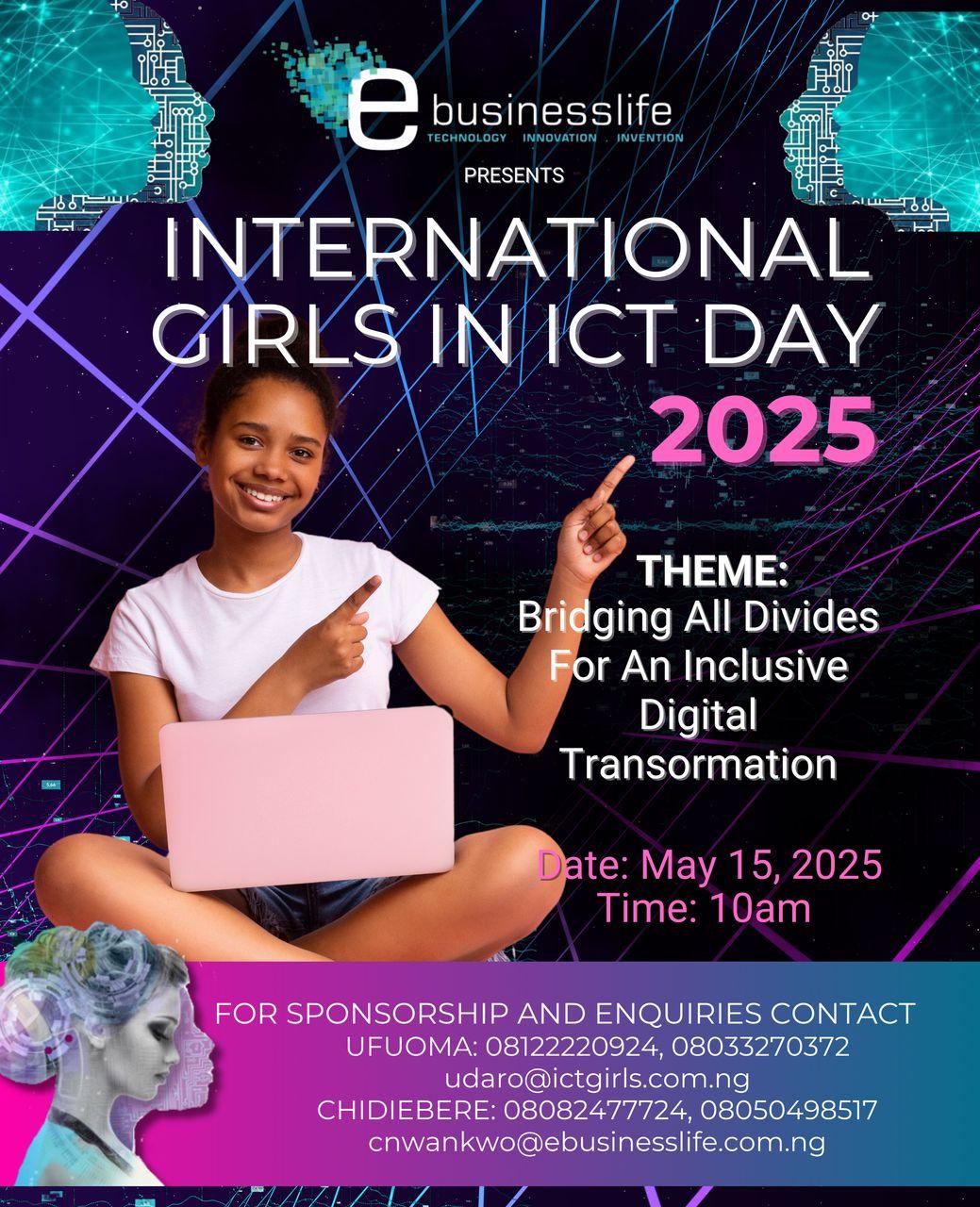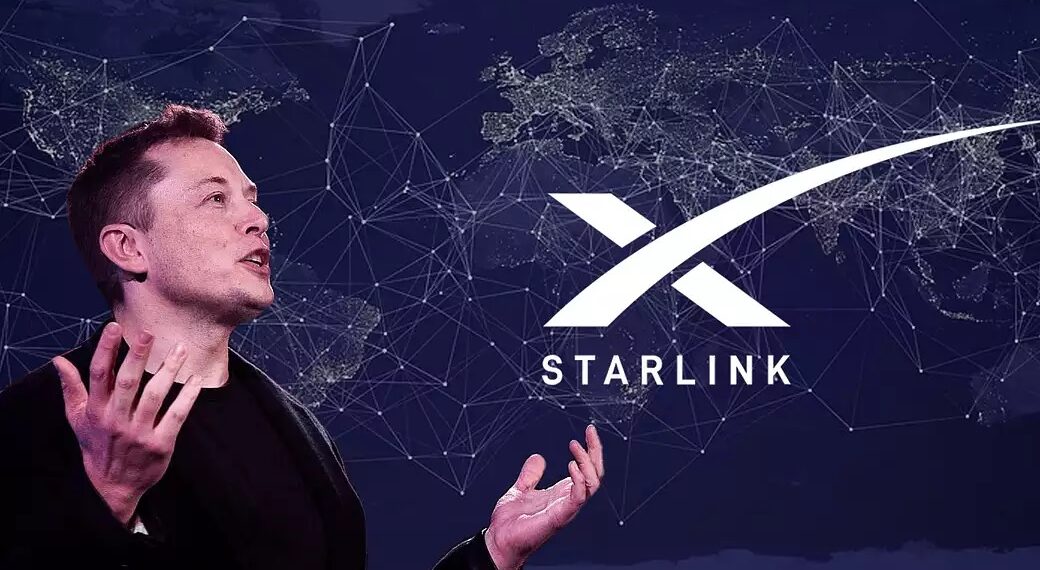Telecom
How Digital Technology Adoption in Agric Sector will Combat Hunger – Pantami

The integration of digital technology in agricultural value chain has been identified as a major stimulus that would help the county combat the challenges of hunger that may arise as a result of increase in the world’s population which is projected to have risen to 10 billion people by 2050.

Dr Isa Ali Ibrahim Pantami, minister of Communications and Digital Economy, stated this on Tuesday in Gombe, Gombe State capital while delivering his keynote address at the opening ceremony of the training program organised to absorb another 140 youthful farmers into the National Adopted Village for Smart Agriculture, (NAVSA).
NAVSA is an ecosystem driven digital platform envisioned for the transformation of the agricultural sector in Nigeria.
It is designed to help farmers and other agricultural ecosystem players navigate their journey across the agriculture value chain.
The minister explained that with the imminent increase in the population with about 2.5 billion that would be challenges of hunger adding that “any nation that fails to strategize on how to take care of itself agriculturally, then will definitely face a very huge challenge because no country export until it is satisfied.
“In less than 30 years, the world population will increase by 2.5 billion which is unprecedented and this increase will come with so many challenges and the number one challenge is going to be hunger especially in the developing nation that are still lagging behind when it comes to policies and strategies.
Citing example of how Netherlands becomes second exporter of agricultural produce in the world with its relatively small population and land mass, Dr Pantami noted that the adoption of digitization in farming would surely bring about transformation into the sector.
“The model of agriculture being practiced in Netherlands reduces the consumption of water by 90 percent, and it increases the quality of production by minimum of 500 percent. It also reduces the use of insecticide by minimum of 99 percent why because the way they deployed modern technology in agriculture.
He added that “climate change and population explosion remain two most dangerous challenges of confronting agriculture and the earlier we use technology to drive the sector the better for us.”
He said, “It is because of this and part of the federal government policy under the administration of President Muhammadu Buhari that the Ministry of Communications and Digital Economy came up with National Digital Economy Policy and Strategy and NITDA has been directed to champion this program on Smart Agriculture in Nigeria.
To appreciate the beauty of digital technology in agriculture, the minster reiterated that digitization is key to economic development and it is no more a luxury but a necessity. “You will appreciate that digital technology is a necessity if you look at the COVID 19 pandemic as it completely disrupted the world,” he added.
The minister who described the consistency in coming up with policies which are geared towards promoting digitization in the country as unprecedented in the history of Nigeria explained that the policies are yielding tremendous result.
“This program is one of the policies given to the parastatals to implement. Other parastatals will join in the training. Nigeria Communication Commission may probably join in 2021. They will start organising similar training because we have so many models to deploy in agriculture.
“So we do hope our teeming youths will grasp the opportunities to become entrepreneurs at the end of the training and support the economy by creating more jobs for our citizens.
Earlier in his welcome address, the Director General, National Information technology Development Agency, Mallam Kashifu Inuwa Abdullahi maintained that the program is part of the Agency implementation to national digital economy policy for digital Nigeria.
He stated further that the innovative initiative is meant to transform agriculture business in Nigeria by making it fancy and attractive investment for the youth and increase food production as well as reduce wastage in the sector.
“In digital economy, innovation plays a huge role in creating values and prosperity. He described it as process of taking idea from inception to impact and coming up with new business model that would make businesses fanciful,” he concluded.
While making his remark, the director general, National Information Technology Development Agency (NITDA) Mallam Kashifu Inuwa Abdullahi informed that with the comparative advantage Nigeria has in agriculture, the youth can make money if they venture into it more than any other sector of the economy.
“Looking at what is happening globally and how digital technology is changing the way we live, the way we work and the way we do business, we see it as a source of inspiration to look at how we can adapt and adopt these technologies in agriculture because most of us in Nigeria take agriculture as our source of income and it contribute more than any other sector to our Gross Domestic Product, GDP,” he noted.
He said the adoption of digital technology in agriculture and the NAVSA initiative would solve the problems wastage associated with the sector which are inadequate knowledge techniques to harvest foods, poor post-harvest management and lack of suitable infrastructure and market platform to sell agricultural produce.
“This initiative would provide a platform for you to share knowledge among yourselves and other stakeholders; in post-harvest management, the emerging technology will help you in preserving the produce and we would create a market platform you because the world is moving into a platform business.
“This national platform will help you to get access to all stakeholders in agriculture value chain in the country and it can provide you link to the off takers that would buy your produce,” he added.
Most of the beneficiaries expressed their appreciations to the Ministry of Communications and Digital Economy and NITDA for the opportunities the NAVSA would avail them. They promised that they would ensure they translate the program to the aspiration of the Agency.
Dignitaries at the event include the NITDA Board Chairman, Dr Abubakar Sa’id, the Vice Chancellor, Gombe State University, Prof. Aliyu Usman El-Nafati, managing Director Galaxy Backbone. Prof M.B Abubakar and host of others.
Telecom
Banks, Telcos Mull New Billing Plans for USSD Airtime Payments

Telecom customers will have to pay for the use of Unstructured Supplementary Service Data (USSD) by having their airtime deducted, according to an information obtained by the Guardian.

According to reports, discussions to implement an end-user billing system between telecom providers and deposit money banks (DMBs) are presently in advanced stages.
A system that charges the client directly for utilizing the USSD service instead of the service provider is known as end-user billing.
This implies that, independent of any further fees the bank may impose, the customer’s mobile account (airtime or direct billing) is deducted for the USSD session.
This is a shift from the conventional corporate billing approach where banks were invoiced for USSD usage.
Gbenga Adebayo, chairman, Association of Licensed Telecommunications Operators of Nigeria (ALTON), said to The Guardian that conversations are underway, and the mechanisms are being fine-tuned to suit subscribers, telcos and DMBs.
r billing, which the banks have been supporting for a while, may help prevent accumulated debts, as seen by the current crisis between the banks and telecom providers, according to Adebayo.
Therefore, we have started talking about switching to end-user paying without causing customers’ services to stop working.
The banks now charge you and debit your account when you make USSD (Debit alert for the transfer). Banks won’t debit you again after the talks are over; instead, your airtime will be used immediately. The funds will be deducted from your airtime rather than your account by the banks.
“The discussion has begun; we will work with the banks to agree on a migration plan. The banks have long been demanding a solution to the USSD debt problem, and this will be it. In order to prevent consumers from being charged for services they did not receive, the parties must nevertheless agree that systems must be updated and operations must be transparent.
“The discussion is underway,” he said.
Recall that on September 16, 2019, the Bank Chiefs wrote to ALTON on behalf of the Body of Banks’ Chief Executive Officers (BOBCEO) proposing a “orderly implementation” of end-user charging for bank clients that would “align with the standard practice for USSD billing.”
The bank executives expressed disapproval of splitting the profits from USSD transactions with the telcos in the note to ALTON.
They stated that the service providers, who supply the platform for the USSD service, had suggested deducting N4.50k per 20 seconds from the fees that clients pay the banks. The banks objected, claiming that it would increase the cost by 45% immediately.
However, the dynamics, especially the underlying technology, made the concept unpopular with the telcos at the time.
Instead, the carriers had demanded corporate billing. According to the telecoms, the banks declined to attend a roundtable in 2020 to address the issue and put a definitive stop to it.
As a result, the USSD obligations that are presently being recovered from were greatly exacerbated by the matter’s failure to be resolved five years ago. Since March 16, 2021, subscribers have been charged N6.98K for each USSD transaction.
The authorities instructed DMBs and MNOs to agree on payment options, either a lump amount or instalments, by January 2, 2025, in a circular jointly issued by the Central Bank of Nigeria (CBN) and NCC.
They stated that the payments must be finished by July 2, 2025, if they are chosen.
It is required that 60% of all pre-API bills be paid in full and as a final settlement. By January 2, 2025, a concerned DMB and MNO must agree on payment options (lump amount or instalments).
To be clear, if a DMB suggests instalment payment, it must be based on equal monthly instalments, and the money must be paid by July 2 at the latest.
Just to be clear, if a DMB suggests instalment payment, it must be based on equal monthly instalments, and the money must be paid by July 2 at the latest.
In accordance with past decisions made by the CBN and the NCC, DMBs are required to settle eighty-five percent (85%) of all unpaid invoices between the relevant DMB and MNO (also known as post-API debts) by December 31, 2024, following the implementation of Application Programming Interfaces (API) in February 2022.
Additionally, within a month of the invoice being served, 85% of all subsequent invoices must be paid off.
The NCC will initiate the required regulatory procedures to switch back to End-User Billing (EUB), provided that the directions in Paragraphs 1 and 2 above are satisfactorily implemented and that the agreement between DMBs and MNOs for the switch to EUB is furthered.
Only MNOs and DMBs that fully adhere to the aforementioned paragraphs 1 and 2 will be permitted to switch to EUB. In due order, the CBN and the NCC will offer guidelines on public education initiatives related to the changeover. MNOs are required to implement the “10-second rule” for USSD invoicing until the transitional procedures in paragraph 3 above are finalized.
Thus, any USSD session that lasts less than 10 seconds is not eligible for billing. “DMBs with prepaid billing options have the opportunity to migrate to EUB, subject to the execution of the required regulatory processes,” the authorities added.
Telecom
MTN, Digital Encode, Back eBusinesslife Girls In ICT Campaign

Leading Mobile network operator, MTN Nigeria has reaffirmed its commitment towards ensuring that the gender disparity in the ICT career sector is bridged.

This statement was made with its backing of the 2025 edition of the International Girls in ICT Day campaign being organised by eBusiness Life Communication Limited.
Also, Leading Cybersecurity and Governance, Risk and Compliance (GRC) firm, Digital Encode have also indicated interest in being part of this year’s campaign.
This year’s event, which will hold at the Lagos Oriental Hotel on May 15, 2025, is part of an annual campaign initiated by the International Telecommunications Union (ITU) to sensitise and encourage young women and girls to delve into ICT and related careers, which have been dominated by the male gender. The 2025 theme will be central on “Girls in ICTs: Bridging ALL Divides for an Inclusive Digital Transformation.”
According to the Chief Executive Officer of eBusiness Life Communication and Convener of the event, Mrs. Ufuoma Emuophedaro, the need to sensitise young girls is premised on the need to shape the future of technology and the roles the female gender will play in this.
In Nigeria, a significant gender disparity exists in the tech industry, with women being underrepresented in both education and employment. Studies show that men are almost twice as likely to pursue computer science and technology careers, and women make up only about 20% of the workforce in the ICT sector.
Mrs. Emuophedaro noted that efforts should be made to introduce young girls to career opportunities in technological and technical fields in both the public and private sectors to help them have a wider range of options and contribute their quota in the industry and in the development of the economy.
The support from foremost ICT companies, heavyweights in their sub-sectors, MTN and Digital Encode, underscores the importance of the campaign.
Digital Encode is a leading consulting and integration firm founded in 2003 that specializes in the design, management, and security of business-critical networks, telecommunications environments and other Information Technology (IT) infrastructures. Recognised in the industry for its vendor independent perspective, the firm’s expertise lies in solving multifaceted, complex enterprise network security and audit problems, also with the concept that a company should run its IT organisation as a business.
MTN Nigeria is one of Africa’s largest providers of communications services, connecting over 87 million people in communities across the country with each other and the world. Guided by a vision to lead the delivery of a bold new digital world, MTN Nigeria has been in the forefront of this campaign to build human capacity in Nigeria.
Digital Encode also provides advisory services toward improvements in Information Security Management, Network Security, Vulnerability Management, Penetration Testing, Computer Forensics, Risk Management and Business Continuity Management.
As part of the 2025 event, there will be a practical AI (Robotic) competition among female students from select secondary schools, roundtable discussion, interactive and motivational talk from renowned women ICT professionals, and Schools’ STEM quiz competition, among others.
International Girls’ Day is an initiative launched through ITU Resolution 70 with the idea of creating a global environment that will empower and encourage girls and young women to consider careers in the field of information and communication technologies.
The ITU declared the 4th (fourth) Thursday of April every year as a special day to celebrate and encourage girls and young women to consider careers in ICT, and the society is reminded to support them in their choice.
This year’s event will have top government and private sector executives in attendance.
Telecom
How Starlink Took over Africa’s Largest Internet Market

Starlink has become a major internet service provider in Nigeria, driven by its reliable, high-speed access.

Its success has led to local internet service providers losing subscribers and raising concerns about unfair competition, according to restofworld.org, which reports global tech stories.
Critical institutions have avoided using Starlink’s network because of national security concerns.
In the sprawling electronic market of Lagos’ Computer Village, an item is flying off the shelves: the Starlink kit.
These satellite dishes, with their distinctive white faces and plug-and-play simplicity, represent more than just easy internet availability in Nigeria. They symbolize a technological coup in Africa’s most populous nation, where terrestrial broadband or wireless options are unreliable or inaccessible.
“I have about 20 pieces in the store, but I’m sure they will go before today ends or at the latest tomorrow morning,” Quadri AbdulFatai, a local electronics vendor who claims to have sold more than a thousand units in just 13 months, told Rest of World. “Starlink is very hot now.”
In January 2023, Nigeria became the first African market that Starlink entered.
Two years later, it now ranks second among internet service providers, which are classified separately from large telecom players by the Nigerian authorities.
With over 65,500 users at the end of the third quarter last year, Starlink is second only to 16-year-old Lagos-based ISP Spectranet, according to data from the Nigerian Communications Commission (NCC), the country’s telecom regulator.
At current growth rates, analysts predict Starlink will become Nigeria’s top internet service provider by mid-2026.
The secret to Starlink’s meteoric rise lies in a simple market reality: Nigerians are desperate for reliable, high-speed internet, which local providers have consistently failed to deliver, according to Temidayo Oniosun, managing director at Space in Africa, a market intelligence company focusing on the continent’s space and satellite industry.
Telecom companies and traditional ISPs in Nigeria suffer from frequent outages, sluggish speeds, and spotty coverage, especially in rural areas where terrestrial infrastructure is limited or nonexistent.
“Nigerians want high-speed and reliable internet, and Starlink’s technology offers that better than anyone else,” Oniosun told Rest of World.
“That’s why it is growing at an incredible speed. While the services aren’t the cheapest, launching with different pricing in different African markets shows that Starlink understands the markets.”
Starlink has made investments in building infrastructure in Nigeria. It has built a base station in Lagos and plans to add facilities in neighboring Abeokuta and Port Harcourt, Nigeria’s oil hub.
These stations will enable the company to beam low-latency internet directly to its rapidly growing user base throughout the country. Low latency is the ability of a network to respond with minimal delay.
Starlink’s success has unsettled competitors. When the company increased subscription prices last October, local operators cried foul, accusing regulator NCC of applying double standards by ignoring their requests for tariff reviews.
The regulator eventually granted local providers a 50% tariff increase in January, but customer perception had been damaged.
The regulator has fostered a fair and enabling environment that empowers all licensed operators, including Starlink, “to compete, innovate, and grow in response to market needs,” an NCC spokesperson told Rest of World.
The regulator has fostered a fair and enabling environment that empowers all licensed operators, including Starlink, “to compete, innovate, and grow in response to market needs,” an NCC spokesperson told Rest of World.
The regulator has licensed over 27 satellite-based communications services providers and issued over 90 landing rights to space segment operators, which include established providers like Eutelsat, SES, Viasat, and YahClick.
“In recent times, the commission has observed growing interest from both established global players and new entrants (especially those providing emerging satellite services) seeking to enter the Nigerian market,” the spokesperson said.
“This level of engagement reflects growing investor confidence in Nigeria’s digital economy and the enabling environment provided by the commission.”
Nigeria has 241 licensed ISPs, of which only 124 had active users as of the third quarter of 2024, collectively serving more than 300,000 subscribers, according to NCC data.
Starlink’s arrival has been nothing short of catastrophic for incumbents. Market leader Spectranet lost 8,428 subscribers between the last quarter of 2023 and the third quarter of 2024, while Tizeti lost about 700 in the same period.
While the losses appear modest, they are significant in the context of the small size of the market served by Nigeria’s ISPs.
The internet landscape is more dominated by mobile network operators MTN, Airtel, Globacom, and 9mobile, which collectively serve 132.4 million subscribers, providing both internet access as well as traditional phone services.
The playing field is fundamentally uneven, said Temitope Osunrinde, chief marketing officer at Tizeti.
The challenges for local operators include buying spectrum and building local capacity, hiring talent, and paying multiple taxes. If digging for fiber, they have to contend with multiple local government right-of-way permits and also area goons.
“You can’t compare Starlink with local companies because they don’t have to set up local capacity, nor hire and set up an office,” Osunrinde told Rest of World.
Gbenga Adebayo, chairman of the Association of Licensed Telecommunications Operators of Nigeria (ALTON), believes Starlink’s success reflects not a failure of local providers but “a challenging operating environment, which includes issues such as multiple taxes, multiple regulations, high right-of-way charges, infrastructure vandalism, and the rising cost of foreign exchange.”
Yet for ordinary Nigerians, these industry complaints hold little water compared with the tangible benefits of reliable connectivity. “For me, it was less speed and more concern about constant internet blackouts during meetings,” Olumide Lewis, a Lagos-based tech worker who recently installed Starlink, told Rest of World. “Since we bought our Starlink, we have had some peace of mind. We don’t spend our time thinking about the bad internet again because everything just works.”

 General News2 days ago
General News2 days agoWorld Bank Announces $800m Support for Nigeria’s CCT Initiative

 General News3 days ago
General News3 days agoSanwo-Olu, Others Grace Launch of 50-Bed Hospital in Surulere by Avon Medical

 E-Financial3 days ago
E-Financial3 days agoCBN Pumps in Additional $150m into Forex Market to Safeguard Naira

 E-Financial3 days ago
E-Financial3 days agoSEC Says CBEX, other Unregistered Digital Platforms are Illegal

 Telecom3 days ago
Telecom3 days agoMTN, Meta Partner to Enhance Voice and Video Calling Quality

 Broadcasting3 days ago
Broadcasting3 days agoKONFAM 89.5 FM Hits Airwaves in Lagos Tomorrow

 E-Business3 days ago
E-Business3 days agoSERAP Calls for Withdrawal of Nigeria’s Data Act Amendment

 E-Financial3 days ago
E-Financial3 days agoKenyan CBN Okays Access Bank Full Acquisition Of NBK




























